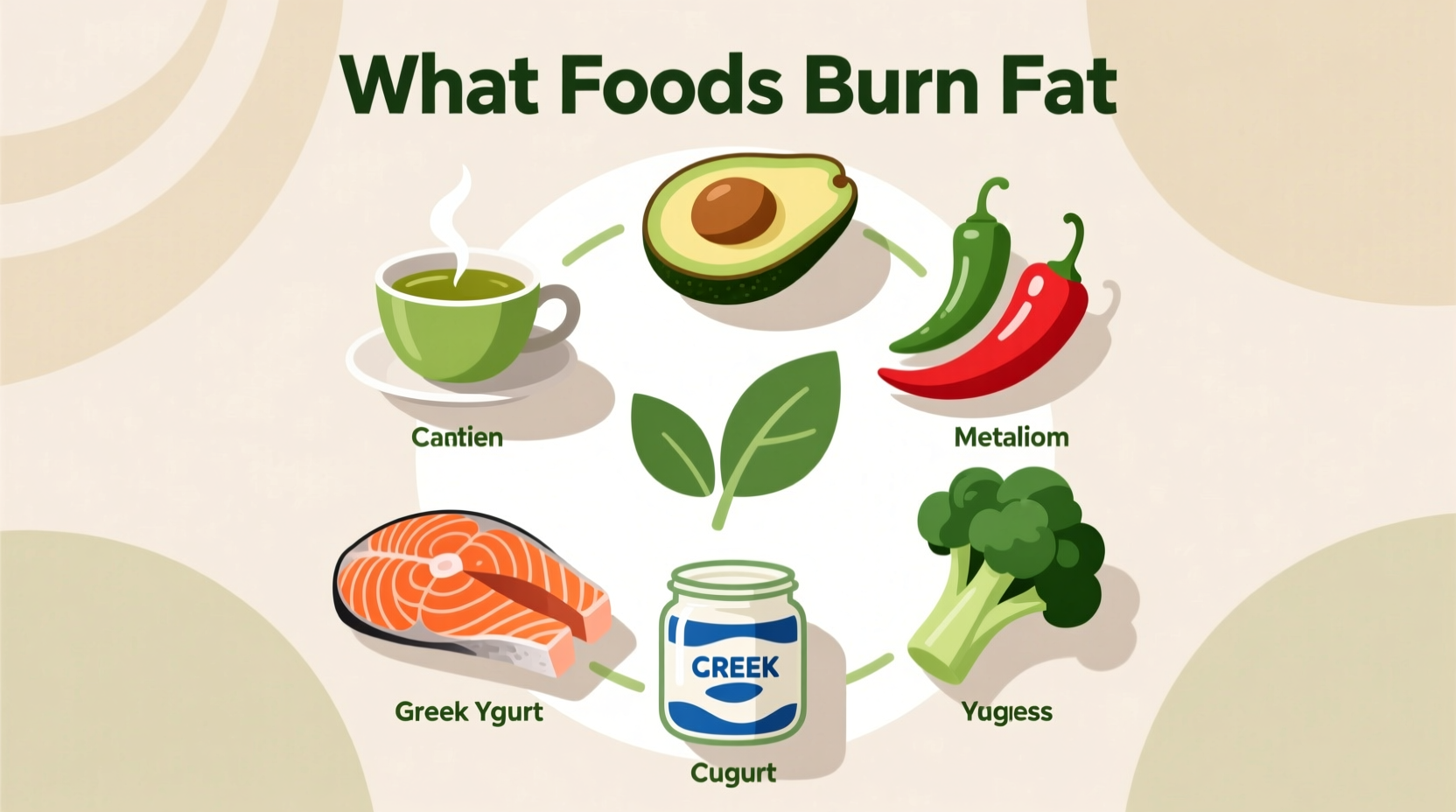No single food magically burns fat. Scientific evidence shows certain foods may support metabolism and fat loss as part of a balanced diet and active lifestyle. Green tea, protein-rich foods, spicy peppers containing capsaicin, and fiber-dense vegetables demonstrate modest metabolic effects in clinical studies, but sustainable fat loss requires calorie management and physical activity.
Searching for "fat-burning foods" often leads to misleading claims promising effortless weight loss. After 20 years analyzing nutrition science, I can tell you the truth: no food burns fat on its own. However, specific foods can support your metabolism when combined with proper calorie balance and exercise. This guide separates scientific facts from popular myths using evidence from NIH studies and clinical nutrition research.
Why the "Fat-Burning Food" Myth Persists
Marketing fuels the misconception that certain foods magically melt fat. The reality? Your body doesn't work that way. Fat loss occurs when you maintain a calorie deficit over time. Certain foods can modestly influence this process through:
- Thermic effect (calories burned during digestion)
- Metabolic rate support
- Hormonal regulation
- Appetite control
These effects are small—typically contributing just 50-100 calories burned daily. Sustainable fat loss requires comprehensive lifestyle changes, not miracle foods.
Myth vs. Reality: Common Misconceptions
| Popular Claim | Scientific Reality | Research Source |
|---|---|---|
| Grapefruit burns belly fat | No targeted fat loss occurs; may support hydration | NIH Study 2017 |
| Apple cider vinegar melts fat | Minimal effect on blood sugar; no direct fat burning | Mayo Clinic Review |
| "Negative calorie" foods exist | No food requires more energy to digest than it provides | Harvard Nutrition Source |
Foods with Research-Supported Metabolic Benefits
Protein-Rich Options
Foods like eggs, Greek yogurt, and lean meats require more energy to digest (20-30% of calories consumed), compared to carbs (5-10%) or fats (0-3%). A NIH study found high-protein diets increased post-meal calorie burn by 80-100 calories daily while preserving muscle mass during weight loss.
Green Tea and Coffee
Caffeine and EGCG in green tea may temporarily boost metabolism by 3-4%. A 12-week clinical trial showed participants drinking green tea extract lost 1.3kg more than controls. Effects are modest and diminish with regular consumption.
Spicy Peppers
Capsaicin in chili peppers increases calorie burn by 50 calories daily according to research in Chemical Senses. While not significant for weight loss alone, it may help reduce appetite when consumed regularly.
Fiber-Dense Vegetables
Broccoli, spinach, and Brussels sprouts provide volume with minimal calories. Their fiber content promotes satiety and stabilizes blood sugar. The Harvard T.H. Chan School of Public Health notes high-fiber diets correlate with lower body weight.

Practical Implementation: Creating Effective Eating Patterns
Instead of chasing magical fat-burning foods, build these evidence-based habits:
Metabolism-Supporting Meal Framework
- Breakfast: Greek yogurt with berries and almonds (protein + fiber)
- Lunch: Grilled chicken salad with mixed greens and olive oil dressing
- Dinner: Salmon with roasted broccoli and quinoa
- Snacks: Hard-boiled eggs or vegetable sticks with hummus
Contextual Limitations to Understand
These foods work within specific parameters:
- Effects diminish with regular consumption (body adapts to caffeine/capsaicin)
- Benefits only occur within a calorie-controlled diet
- Individual responses vary based on genetics and gut microbiome
- No food compensates for excessive calorie intake
What Really Matters for Sustainable Fat Loss
Research consistently shows these factors drive meaningful results:
- Calorie management: 500-calorie daily deficit creates 0.5kg weekly loss
- Protein intake: 1.6-2.2g per kg of body weight preserves muscle
- Sleep quality: Less than 7 hours nightly disrupts hunger hormones
- Strength training: Maintains metabolism during weight loss
The CDC's evidence-based guidelines confirm gradual weight loss (1-2 pounds weekly) yields the most sustainable results. Foods supporting metabolism play a minor supporting role in this comprehensive approach.
Creating Your Personalized Plan
Instead of focusing on individual "fat-burning" foods, consider these actionable steps:
- Track your current eating patterns for 3 days using a free app
- Replace one processed snack daily with a protein/fiber combination
- Add 10 minutes of walking after meals to improve glucose metabolism
- Prepare one extra meal weekly to avoid unhealthy convenience choices
These small changes create compound benefits far exceeding any single "miracle" food. The National Institutes of Health's weight management research shows consistent modest changes produce better long-term results than extreme dietary restrictions.











 浙公网安备
33010002000092号
浙公网安备
33010002000092号 浙B2-20120091-4
浙B2-20120091-4